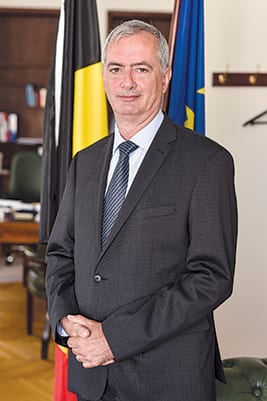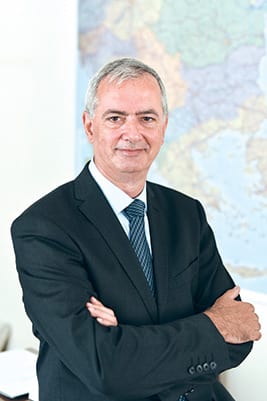We have, over recent years, consistently defended the view that the Western Balkans needs to be given a European, merit-based perspective. That means that candidate countries like Serbia need to respond to a broad set of accession criteria and implement the necessary (legislative) reforms. From the Belgium perspective, the priority has to be given to the fundamentals of a democratic society
After the much-anticipated European Parliament election, Belgium turned out to be among those countries that both lost and gained something in the process. Soon the country will be left without a prime minister. In this interview with Ambassador of Belgium H.E. Koenraad Adam, almost a year after the start of his post in Belgrade and shortly after the celebration of the National Day of Belgium, we talk about the EU and much more.
How would you comment on the appointment of Charles Michel as president of the European Council?
It is a great honour for Belgium, and indeed a recognition of our European ‘credentials’, to see our Prime Minister is elected by his peers as the new President of the European Council.
At the same time, we hope that with this appointment the Belgian ‘model’ of compromise-seeking, aimed at bridging differences between our constitutive language groups, may also inspire European decisionmaking at the highest level.
The new president of the European Commission, Ursula von der Leyen, was also born in Belgium. Her appointment, as well as the election of Christine Lagarde as the future governor of the European Central Bank, means that two important European institutions will be led by women. How would you comment on this?
My country has always been a determined advocate of more gender equality at the highest level of decision-making, including in the EU. Our European Commissioner, Marianne Thyssen, who is responsible for the social affairs portfolio, is an exponent of this policy. We commend the election of women to at these influential positions, and welcome in particular the commitment of the new Commission President, Mrs von der Leyen, to reserve half of the positions in the new Commission to female Commissioners.
What do you consider as the greatest challenges for the EU in the immediate future?
In the short term, the biggest challenge is – without any doubt – getting a good grip on developments regarding Brexit. There is no positive side to this episode, and we must take care not to let it derail. Some important decisions still have to been taken, and a balance will need to be found to protect the European project and safeguard the interests of its citizens and companies while working towards a renewed and close future relations with the UK.
Across the political spectrum, it would be helpful if the narrative would change in a more constructive and less aggressive and confrontational style of political discourse
The EU has recently adopted a strategic agenda that will help us to focus on priority areas in the coming months and years: protect citizens and freedoms, develop a vibrant economy, build a climate-neutral Europe, and promote EU interests and values on the global stage… By responding to those challenges, the EU will foster the confidence of its citizens in a safe, healthy and prosperous future.
French President Macron recently reiterated his reservations regarding EU enlargement until the Union undergoes deep internal reforms. How should Serbia interpret this message?
It is not really up to a Belgian Ambassador to interpret the words of a French President, but I noted that, during his recent visit to Serbia, President Macron made it clear that he considers this as parallel and not sequential processes: reforms are required in the Union as well as in Serbia.
What is Belgium’s position on the enlargement of the European Union to encompass Western Balkan countries?
We have, over recent years, consistently defended the view that the Western Balkans needs to be given a European, merit-based perspective. On their journey to the EU, candidate countries like Serbia need to respond to a broad set of accession criteria and implement the necessary (legislative) reforms.

From the Belgium perspective, it is of crucial importance that priority during this reform process is given to what has to be considered as the fundamentals of any democratic society: the rule of law, including the fight against organised crime and corruption, and respect for fundamental freedoms, such as the freedom of expression.
Coming to terms with the recent, traumatic past will be indispensable in paving the way to regional reconciliation and cooperation, which are prerequisites for a harmonious future within the European family. Let me also stress that each country will be judged on the basis of its own merits.
In your opinion, what does the speed of Serbia’s EU integration depend on the most? What should the government in Belgrade pay special attention to?
In my view, Serbia would really benefit from a policy in which more efforts are focused on those issues over which it has complete control, i.e. the internal reform agenda. The Progress Report of the European Commission offers a clear and detailed road map of what is expected in the different negotiation chapters, including with some concrete policy recommendations.
It will be important to demonstrate that this is not only an exercise in paying lip service or ticking boxes, but that political will is also translated in actual, tangible implementation on the ground.
Across the political spectrum, it would also be helpful if the narrative would change in a more constructive, less aggressive and confrontational style of political discourse.
I hope to see more frequent political contacts once the dust settles on the postelectoral political situation in Belgium
How would you assess the messages from the latest EU-Western Balkans Summit, held in Poznan, Poland, in early July?
What you are referring to is the so-called “Berlin process” and not the EU-Western Balkans Summit that was last held last year in Sofia. The Berlin Process gathers some EU members states, the Western Balkans 6 and some international financial institutions.
Belgium is not a member but believes that this process offers a welcome contribution to the regional integration agenda in several ‘connectivity’ areas, such as transport infrastructure, telecommunications and energy. It is above all a ‘confidence-building’ platform that brings together the leaders, civil society stakeholders and business communities of the Western Balkans in a format that allows for a direct exchange of views, also with the European partners that accompany the process.
The Poznan meeting consolidated progress, but at the same time, it is obvious that – despite some important successes, such as the Prespa Agreement or the entry into force of the roaming agreement – the region still suffers from too many wounds that need to heal.
The media noted your statement that you do not want to interfere in the dialogue between Belgrade and Pristina on the normalisation of relations because this is an issue they have to solve themselves. Do you really believe that a solution can be reached without participation, some would say even influence, of Brussels, Washington, Moscow etc.?
Let me clarify: Belgium has no intention of interfering directly in the dialogue for the simple reason that we are fully backing the facilitation efforts of Frederica Mogherini, the High Representative of the EU for Foreign Affairs and Security Policy.
I agree, though, with the assessment that both Belgrade and Pristina will probably need some external ‘encouragement’ to show the indispensable political courage required for the normalisation to materialise. Given the European aspirations of both countries, it is logic that the EU remains in the driving seat of the facilitation process.
It is obvious, however, that at the end of the day the constructive attitude of all major powers will be necessary to bring about a sustainable result of these negotiations.
In statistical terms, based on the figures from our own export agency, 2018 was an exceptionally good year, with a bilateral trade volume of nearly 900 million euros
As regards Belgium’s input, I would like to draw attention to the fact that Kosovo is regularly discussed in the UN Security Council, where Belgium tries to play a bridge-building role as a non-permanent member.
Belgium also stands ready to assist with any advice, if required, drawing on its own history of ‘constitutional engineering’ that brought together our language communities in a complex but peaceful set-up.
At the end of your first year as ambassador in Serbia, what would you say about bilateral relations between Belgium and Serbia?
 I have been pleasantly surprised by the intensity of those relations, on all levels of interaction: a bilateral political dialogue has been established between both our ministries of foreign affairs, the Police Action Plan was rolled out for the first time at the end of last year, and both our Prosecutors have met to step up cooperation.
I have been pleasantly surprised by the intensity of those relations, on all levels of interaction: a bilateral political dialogue has been established between both our ministries of foreign affairs, the Police Action Plan was rolled out for the first time at the end of last year, and both our Prosecutors have met to step up cooperation.
In the cultural field, there is a continuous inflow of high-quality Belgian productions, be that in the domain of theatre, dance, music or film, and the economic dimension of our presence is growing. I hope to see more frequent political contacts once the dust settles on the post-electoral political situation in Belgium.
You recently stated that Belgian investors are interested in investing in Serbia and that Serbia’s main advantage is people. In what areas do you see the possibility to expand cooperation?
In statistical terms, based on the figures from our own export agency, 2018 was an exceptionally good year, with a bilateral trade volume of nearly 900 million euros. Even if we flatten out the few exceptional transactions that inflated that figure, the upward trend remains very evident. This is due to a great extent to the trade movements generated by Belgian investments in Serbia, with products aimed at the export market. These are companies I’ve visited, and that have confirmed to me their faith in the quality of the workforce and their readiness to expand. But the best prospects for Belgian companies lie probably in the areas of ICT, renewable energies, waste management and construction.
You’ve said that, apart from political and economic cooperation, connecting in the field of culture is very important for the two countries. Do you already have a plan on how to strengthen cooperation in culture between Belgium and Serbia?
The direct impact of the Embassy is limited: given the specificities of our constitutional set-up, competences in the area of culture (promotion) lie entirely in the hands of the three language communities. However, we do try to develop an integrated approach, with support for activities that contribute to the Belgian image abroad.
As an Embassy, we have been involved in the promotion of Belgian participation in BITEF, the Belgrade Dance Festival (BDF), the Saxophone Festival and the Guitar Art Festival. I know that the upcoming BITEF and BDF season will dedicate a lot of attention to Belgian productions, and I am thrilled by the prospect of enjoying – together with the Belgrade public – some magical moments of cultural genius.
| FOCUS
In my view, Serbia would really benefit from a policy in which more efforts are focused on those issues over which it has complete control, i.e. the internal reform agenda |
CHALLENGE
In the short term, the biggest challenge – without any doubt – is to get a good grip on developments regarding Brexit |
PROSPECTS
The best prospects for Belgian companies lie probably in the areas of ICT, renewable energies, waste management and construction |
|---|